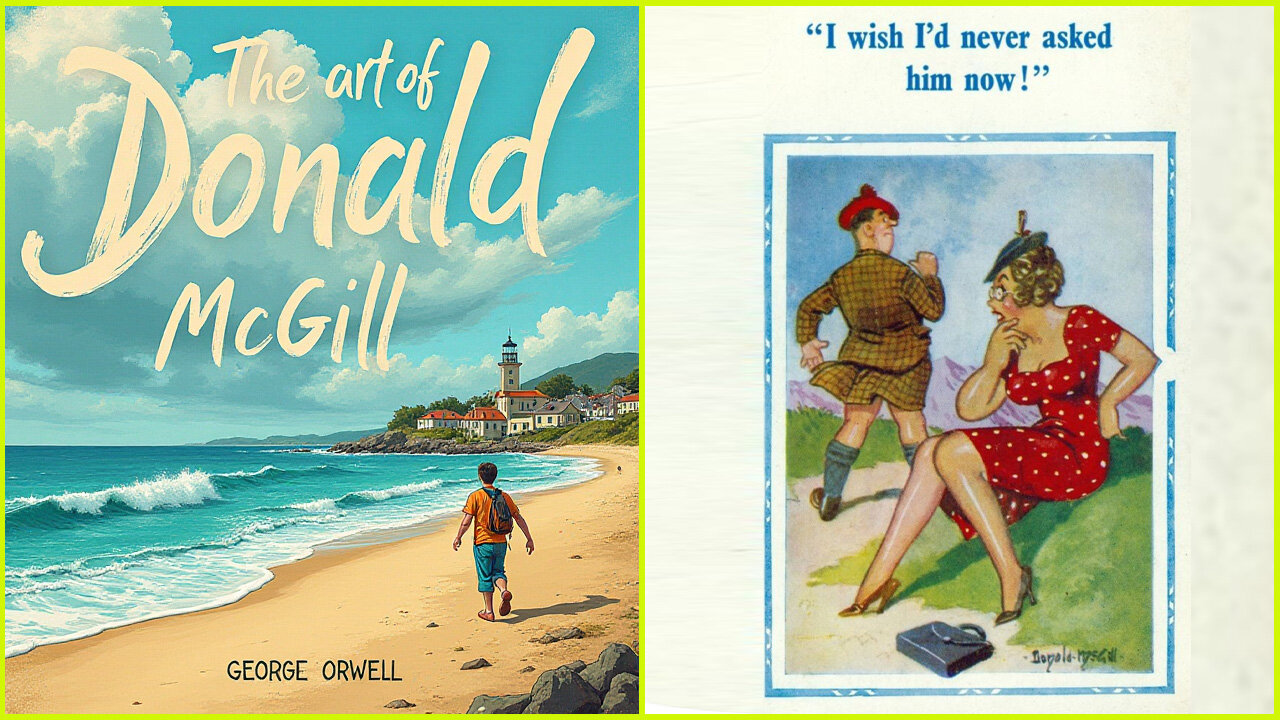Premium Only Content

'The Art of Donald McGill' (1941) by George Orwell
This essay by Orwell critiques the work of British cartoonist Donald McGill, known for his humorous postcards featuring risqué and satirical imagery. Here’s a summary of the key points and themes in the essay:
Cultural Commentary: Orwell examines McGill’s art within the context of British society in the early 20th century. He argues that McGill's postcards reflect the cultural attitudes and humor of the time, which often involved innuendo and social commentary.
Artistic Value vs. Commercialism: The essay discusses the tension between genuine artistic expression and commercial art. Orwell contends that McGill's work, while popular and commercially successful, lacks depth and sophistication compared to higher forms of art.
Humor and Satire: Orwell appreciates McGill's ability to engage with contemporary issues through humor, but he also critiques the superficiality of the humor, noting that it often appeals to base instincts rather than provoking thoughtful reflection.
Social Critique: The postcards often serve as a mirror to society, highlighting the absurdities of social conventions and human behavior. Orwell reflects on how McGill's work offers insight into the psyche of the British public and their attitudes toward sex, morality, and propriety.
Personal Reflection: Throughout the essay, Orwell provides personal insights into his own feelings about McGill's art, oscillating between admiration for the craft of the postcards and disdain for their lack of substance.
Overall, Orwell's essay serves as both an appreciation of McGill's unique contribution to popular art and a critique of its implications for society and culture. It encourages readers to think critically about the nature of art and its role in reflecting and shaping societal values.
-
 2:45:39
2:45:39
Tundra Tactical
8 hours ago $13.00 earnedTundra Nation Live : The Worlds Okayest Gun Live Stream
39.3K -
 17:06
17:06
Professor Nez
5 hours ago🚨BREAKING: Elon Musk to BUY MSNBC!? Dems STUNNED by Brian Williams’ Viral Video!
32.5K35 -
![If You Smell LALALALA What CHiLi IS COOKING!!... #RUMBLETAKEOVER [Overwatch 2]](https://1a-1791.com/video/s8/1/e/s/X/3/esX3u.0kob-small-If-You-Smell-LALALALA-What-.jpg) 4:27:40
4:27:40
CHiLi XDD
7 hours agoIf You Smell LALALALA What CHiLi IS COOKING!!... #RUMBLETAKEOVER [Overwatch 2]
21.1K1 -
 LIVE
LIVE
Delnorin Games
8 hours ago🔴 Live - Star Citizen
1,133 watching -
 1:39:44
1:39:44
HELMET FIRE
10 hours agoDEADROP IS BACK!
127K6 -
 10:03
10:03
Tundra Tactical
12 hours ago $14.14 earnedBrandon Herrera Vies Bid for ATF Director!
80.1K15 -
 22:01
22:01
DeVory Darkins
1 day ago $34.15 earnedHakeem Jeffries SHUTS DOWN The View as Matt Gaetz Speaks out
70.3K110 -
 2:02:54
2:02:54
Mally_Mouse
11 hours agoLet's Play!! - Spicy Saturday
51.3K1 -
 1:33:06
1:33:06
Slightly Offensive
11 hours ago $27.71 earnedAre You Ready for What's Coming Next? | Just Chatting Chill Stream
69.5K39 -
 32:10
32:10
MYLUNCHBREAK CHANNEL PAGE
1 day agoThe Gate of All Nations
142K61